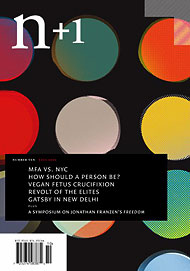[contextly_auto_sidebar id=”hMpJwAX7ROFisoxfaiwhWpOQbmzRcRS5″]
BY now, we’re all pretty familiar with the information-wants-to-be-free argument, and if you write for a living, or have had to endure numerous unpaid internships to break into a creative field, you know it all too well.
A wide-ranging, perceptive, and slightly arch essay in the hip Brooklyn journal n+1 sketches out the development not only of the Free Culture crowd — a mix of hackers, utopians, academics, and hypocrites, it argues — as well as, more recently, its opposition.
The Free movement had a few professorial spokespeople and millions of adherents; antifree was a small group of interested artisans speaking up for the dignity of being gainfully employed. As antifree grew beyond the small world of left-wing blogs, it attracted 25-year-olds who objected to being paid $50 by a corporate website that presumed them lucky to get the experience. It attracted veteran journalists who balked at being asked to write for a large, profitable magazine’s website for chump change. And it attracted unpaid interns, who at profitable media corporations (ranging from Condé Nast to Gawker), actually filed suit for violations of labor laws. These were individual stories, but they added up. The entities that had once supported journalists and writers were now doing their best not to pay them for the simplest of reasons: they could get away with it.
There’s a lot in here –Steve Albini and the alt-rock ’90s, the 2008 recession, the shrinking of book publishing, Pierre Bordieu, the longreads movement, Astra Taylor’s The People’s Platform, and so on.
There’s even a smart retort to Lewis Hyde’s The Gift: “As it happens, Hyde’s book is often cited as an argument against payment for writing—“Art is a gift,” these people say, as they pick up their paychecks from Princeton or Iowa or Columbia.”
The piece concludes this way:
In the argument between the free and the antifree, we’re with the antifree. Across a whole range of issues, a simple defense of intellectual property is right now a rebuke to the corporations, not a sop to them… On the money side, perhaps the next step for antifree is to create and strengthen a union—one that can demand standards for contracts, reprimand institutions for reneging on terms or norms of conduct, and otherwise represent the interests of culture workers before the ultimate bearers of responsibility for the diminishing of salaries and security: media conglomerates, corporate boards, and shareholders. And what about tax reform?
Solutions to this are tough, but the n+1 gang is on the right track.

“Free” newspapers are just booklets full of ads – plus advertorial which supports those ads.
“Free” journalism has been paid for – by the organisations and nations whose interests are promoted within them. Wikipedia is a corrupt source of Pentagon-sponsored lies, for example. The details of the Israeli Gaza conflict have been redacted by the Pentagon and then locked.